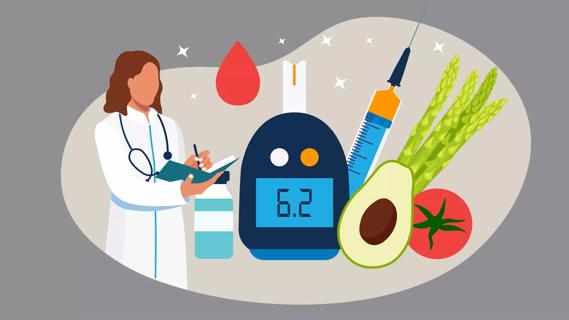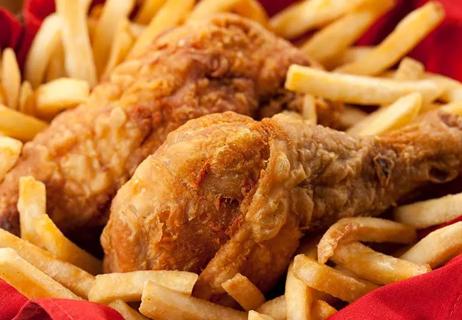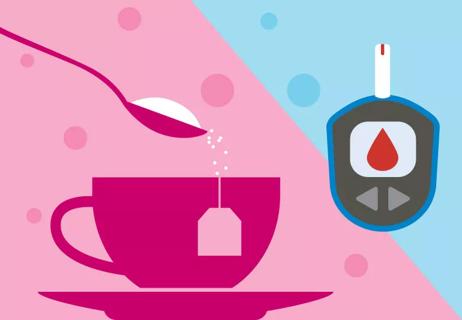From the 4 best weight loss diets to Type 1 and Type 2 diabetes weight loss tips

Are you trying to lose weight while managing diabetes? “If you have excess weight, losing even 5% of your total body weight can dramatically boost your health. Weight loss can not only improve your blood sugar levels but can lower high blood pressure, heart disease risk and even the amount of medication you take,” says registered dietitian Andrea Dunn.
Advertisement
Cleveland Clinic is a non-profit academic medical center. Advertising on our site helps support our mission. We do not endorse non-Cleveland Clinic products or services. Policy
But when you’re considering the weight loss options for Type 1 and Type 2 diabetes, it’s important to avoid a quick fix. For lasting success, Dunn says, focus on good nutrition and changes you can commit to.
Below, she outlines what else you need to know to successfully drop pounds when you have diabetes.
Obesity is a major risk factor for developing insulin resistance. And insulin resistance is a big step toward developing Type 2 diabetes. It’s also a major obstacle to achieving long-term blood sugar control. But weight loss can be an effective antidote — with one study showing that losing 16% of your excess pounds can put diabetes into remission.
Staying at a healthy weight is also a worthy goal if you have Type 1 diabetes. But people with Type 1 diabetes can’t make insulin and need to take an injectable version. In turn, taking insulin can lead to weight gain as can eating extra carbs to stabilize low blood sugars so additional measures are needed.
These diets offer well-rounded nutrition and increased odds for weight loss for patients with both Type 1 and Type 2 diabetes:
DASH stands for Dietary Approaches to Stop Hypertension. It was created to help lower blood pressure, but the DASH diet goes well beyond that. It’s a well-rounded, healthy nutrition plan for everyone, not just those with diabetes.
Advertisement
DASH is rich in fruits, vegetables and grains and low in fat, sugar and sodium. For example, on a 1,600-calorie a day DASH plan, you would eat:
More a lifestyle than a “diet,” the Mediterranean diet is based on how some eat in Greece, southern France and Italy. It involves eating lots of vegetables, nuts and healthy fats.
To follow it properly, you should get the majority of your calories from plant-based foods. Eat:
You can eat healthy fats every day, such as those from avocados, nuts, seeds and olive oil. Eat fish and seafood weekly. Choose eggs and poultry more often than red meats. Limit sweets to only a few times each week.
Most plant-based diet plans cut out or dramatically limit meat:
This diet involves eating lean protein sources, including beans and lentils. The total fat you consume is about 30% calories from fat, with saturated fat at 10% or less. At least half of your daily grains should come from whole grains. You should also eat:
“Extreme diets can put you at risk, depending on which diabetes medications you’re taking or if you have other medical issues along with diabetes,” says Dunn.
Here are the diets you may need to avoid:
Using insulin or taking a sulfonylurea (a category of blood sugar-lowering medications) while avoiding carbs can put you at risk for low blood sugar. And if you’re on a fixed insulin dose, you may need to eat carbohydrates more consistently to avoid drops in blood sugar. So if you want to follow this kind of diet for weight loss, check with your physician first.
“Depending on how low carb the diet is, your doctor may order monthly lab work to rule out low potassium or magnesium or elevated lipids or uric acid levels,” says Dunn.
Any diet that promotes fasting for long periods can cause low blood sugar. Even if you aren’t taking diabetes medication, it’s important to maintain consistent eating patterns for weight management and blood sugar control. Be aware of how much you eat at any one time to avoid spiking your blood sugar.
Advertisement
Any weight loss diet that preaches very low caloric intake (800 calories or fewer per day) can also increase the risk of low blood sugar and reduced muscle mass. The bottom line: These kinds of diets should be supervised by your doctor.
“Beware of too-good-to-be-true claims made about non-prescription pills and cleanses,” says Dunn. These dietary supplements aren’t approved by the Food and Drug Administration (FDA), so you don’t know what you’re getting. And, she says, some products may even harm your health or contain ingredients that can interfere with your prescription diabetes medications.
If you still find it hard to lose weight with diet and exercise alone, Dunn shares 10 tried-and-true weight loss tips to help jump-start your progress:
Dunn says meal replacement shakes specifically for people with diabetes or calorie-moderated frozen meals can make it easier to follow structured, lower-calorie eating plans. “You can feel comfortable eating the whole amount because it’s already portioned. Look for meals in the 220- to 300-calorie range. You can even eat an extra serving of vegetables, fruit or dairy with them and stick to your calorie budget.”
For meal replacement shakes, Dunn recommends you:
Advertisement
Another diabetes and weight loss tip you can take to the bank? “Try noshing some raw fruit or vegetables with your meal replacement shakes. They give you chewing satisfaction, which helps quell hunger, and can make you feel fuller and more satisfied than just having the shake alone.”
No matter what diet you choose, Dunn says that eating fruits and veggies is a must. “Any style of eating that promotes good health includes produce,” she explains. “Figure out what you like — fresh, cooked, frozen or canned — and get in at least five servings each day at meals and for snacks.”
Just be extra careful around canned options as canned vegetables can have higher sodium and canned fruit can have higher sugar amounts due to syrup. Look for canned vegetables labeled ‘no salt added’ and fruit packed in 100% juice or water.
Choose whole foods over highly processed foods as much as possible:
Advertisement
Analyze your home and work environment. Do you have easy access to high-calorie, sugary foods? (Hello, snack drawer.) Do you snack because you’re hungry or because you saw someone else eating?
“When and how much you eat may make a difference as well. Many newer studies say it’s beneficial to eat more food earlier in the day and then less as the day goes on,” Dunn adds. “If you’re skipping meals all day and then eating dinner and snacking all night, that may be why you’re not achieving your goals.”
Make water your beverage of choice. Drinking a lot of alcohol and sugar-sweetened drinks like soda, iced tea and fruit juice won’t do you any favors.
Overhauling your lifestyle can feel overwhelming. But doing it gradually makes it easier. Try cultivating one new healthy habit at a time, such as:
Experts, including Dunn, advise adopting a healthy behavior you can live with, and add more changes when you can.
Move as much as you can. Exercise of any kind speeds up the metabolism and accelerates weight loss.
Dunn emphasizes the importance of talking to your doctor before making any diet changes. “Some diabetes medications cause weight gain. And if you have Type 1 or Type 2 diabetes and take insulin or another drug that lowers blood sugar, you could be at risk for low blood sugar issues if you change your diet without adjusting your diabetes medicine.”
Some newer Type 2 diabetes medications make it easier for patients to lose weight. These drugs — liraglutide and empagliflozin — are also beneficial to the heart. If you are taking a different medication and having trouble losing weight, ask your doctor if one of these might be right for you. Also, be sure to check if your insurance plan covers its cost.
If the weight is stubborn, consider consulting a bariatric surgeon. A weight-loss surgical procedure might be your ticket to success. “There’s evidence that the weight lost after these procedures can put diabetes into remission and reduce the risk from its complications,” says Dunn.
If your doctor is associated with a medical center, find out if there’s a diabetes management or weight loss program you can tap into. If not, check the website of the pharmaceutical company that makes your diabetes drug, since many companies have patient support programs.
“Weight loss is not just about diet and exercise. Hormones, genetics, sleep, medications and stress all play a role,” says Dunn. “So if you’re having problems losing weight, work with your doctor, registered dietitian or a certified diabetes educator to set up a healthy weight-management plan. They can make sure your diet is realistic and right for you — and that it will mesh well with your diabetes treatment plan.”

Sign up for our Health Essentials emails for expert guidance on nutrition, fitness, sleep, skin care and more.
Learn more about our editorial process.
Advertisement

Hot, humid weather can affect your blood sugar levels and even cause dehydration or heat stroke

The good news? Prediabetes can be erased with healthy lifestyle changes, including eating more nutritious foods

Fresh or frozen fruits that are low on the glycemic index should be your go-to, as they’re full of fiber and other nutrients

Adding nuts like pistachios, almonds or pecans to your diet can help manage blood sugar levels

A diabetes diagnosis, new or long-standing, can trigger reactions like grief, stress, depression and frustration, but symptom relief and help are available

The short answer: Yes, but you need to eat it in moderation and keep track of how much you consume

Sweet potatoes are great, but sweetened drinks aren’t so great

Some sweeteners may have health risks, so it’s best to keep your intake moderate

Even small moments of time outdoors can help reduce stress, boost mood and restore a sense of calm

A correct prescription helps your eyes see clearly — but as natural changes occur, you may need stronger or different eyeglasses

Both are medical emergencies, but they are very distinct events with different causes